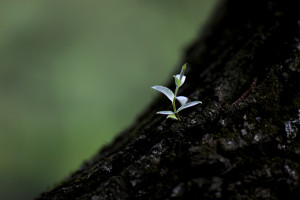
Springtime in Southern California comes early. In our little mountain town, buds formed on the trees in February while daffodils pushed through the soil and have recently bloomed. Despite a few frosts and even snowfalls since the signs of spring arrived, the hills remain green and some neighbors have re-begun watering their lawns in anticipation of the summer heat.
I hope to plant some flowers this year, but since living in this house, I’ve acquired an unlucky green thumb. When I was a child and even into my teenage years, I planted vegetables and flowers in the various flowerbeds around my parents’ house. Green beans proved to be the most satisfying crop, although the Foxgloves I planted as seeds so many years ago run rampant in and out of their flowerbed.
I remember inspecting the soil in the days and weeks after burying seeds. Whenever a shoot and two leaves finally appeared, I knew I had done something right. Now, I thought, if only the tiny plants would survive heavy rains, roaming deer, and any accidental stomps by my younger siblings. Poking above ground begins a long road of vulnerability to the elements.
Like new growth in spring, openly living as a birthmother leaves me in a vulnerable place. But in order to grow, I have to raise my head above ground.
I quote from Brené Brown a lot in my blog posts. Her books have taught me so much about authenticity, empathy, shame and vulnerability. “Daring Greatly,” published in 2012, was specifically written on the topic of vulnerability.
In the opening pages, Brown quotes Teddy Roosevelt’s 1910 speech “Citizenship in a Republic,” known alternately as, “The Man in the Arena”:
It is not the critic who counts; not the man who points out how the strong man stumbles, or where the doer of deeds could have done them better. The credit belongs to the man who is actually in the arena, whose face is marred by dust and sweat and blood; who strives valiantly; who errs, who comes short again and again…and who at the worst, if he fails, at least fails while daring greatly….”
Brown identifies this passage of Roosevelt’s speech as a summation of her research on vulnerability:
Vulnerability is not knowing victory or defeat, it’s understanding the necessity of both; it’s engaging. It’s being all in.”
What Brown, Roosevelt, and little plants know is that to grow, succeed and flourish, we have to try. We put ourselves “out there,” in places where others can attack us, where we can fall or fail, all in an effort to claim the victory we crave.
As a birthmother, one victory I crave is to be a good mother to Dominic. As discussed in a previous post, I find it necessary to be open about my birth motherhood to reach this goal. Although the positive reinforcement my openness has received has boosted my confidence, certain situations leave me feeling more vulnerable than others.
Should I list my blog on my resumé? Will new acquaintances — especially women and mothers — judge and criticize me for my decision to place? Did my neighbor, who was pregnant at the same time as me, quit having such friendly exchanges because I came home without a baby?
Not all vulnerability is outwardly rewarded. Like the man in the arena, sometimes being in the fight only earns us a sucker punch. But like Roosevelt pointed out, the critic and the other fighter are not the ones whose opinions count.
Regardless of the circumstances, I think all of us feel vulnerable sometimes. The question Brown poses is, will you let this feeling keep you from speaking your truth?
Under what circumstances do you feel the most vulnerable? Have you found it valuable or rewarding to practice vulnerability? Share your thoughts in the comment box below.

Emily, you’ve got another Brene Brown fan here! My daughter and her friend recommended Brene to me several years ago. When I finally got around to reading her, I wondered what the heck took me so long!
Loved your metaphor of new plants raising their heads above ground and becoming vulnerable, but having the chance for life.
Thank you. xoA
Very Inspiring and thought provoking post. I am always afraid of being too vulnerable with those around me. Thank you for helping me see the good in it.